A Father's Love
Issues with Daddies in Shakespeare
The most popular article I have written for Shakespeareances.com was posted on May 10, 2012. Titled "A Mother's Love: Shakespeare's Ode to Mothers Is Sometimes in their Absence," the article was written for Mother's Day that year. It remains the most visited page on this site and has spawned more links, references, and reprints than any other Shakespeareances.com item.
This article is certain to get no such love. Why? Because it is about fathers. Awwwwww.
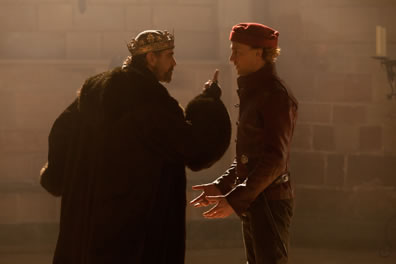
Prince Hal (Tom Hiddleston) with his father, Henry IV (Jeremy Irons) in William Shakespeare's Henry IV, Part Two, an installment inThe Hollow Crown. Henry is like many dads who want to share their passions, knowledge, vocation, and avocations with their kids. Photo by Joss Barratt, Neal Street Productions.
Not that I'm grousing. Well, yeah, I am grousing, and I will blame William Shakespeare in short order, but Father's Day is a perfect time to muse on why dads get such short shrift compared to moms.
Two words: "Mothering Sunday." Dating back to the 16th century, this special day on the Christian calendar celebrates the role of mothers. In the early 20th century, the greeting card industry co-opted it in the United States to create Mother's Day. At that point somebody said, "Hey, how about a day for fathers, too? Sell more cards!" And thus, we got our day—kind of an afterthought.
A recent survey indicated that "a whopping 83 percent of respondents say they would celebrate Mother's Day over Father's Day, if they could only choose one," reported CBS News (yes, the story says whopping). Americans are expected to spend about $7.4 billion less on gifts for dads this Father's Day than they spent on moms for Mother's Day last month, says the National Retail Federation. In fact, Mother's Day is now the third highest spending holiday of the year behind Christmastime, of course, and "Back to School." Valentine's Day is fourth followed by Easter. Father's Day comes in sixth—two holidays after Mother's Day, but at least we come in ahead of the Super Bowl for holiday spending. Go Dads Go.
Admittedly, we dads are partly responsible for this state of Days. Ask a mother if she wants a special day during which she gets pampered and lauded, and she says, "Bring it on!" It's one day she isn't even allowed to be a martyr. Ask us dads if we want a day of pampering, and we either kick in the macho, "No, I'm good" reaction or we give that puzzled look dogs are famous for: "You mean, like last weekend?" Yeah, fathers getting one day of feting does seem a bit silly given the number of weekends they fete themselves the year round.
Nevertheless, it's the institution of fatherhood I'm contemplating here, and we'll take a brief, not-too-deep look at Shakespeare's treatment of it.
One of the theatrical traditions that shaped Shakespeare was commedia dell'arte, the Italian street theater format that relied on stock characters in masks. One of those stock characters is the Pantalone, the greedy old guy at the top of the social order and most often depicted as a father to one of the young lovers in the play. As such, he becomes an obstacle to the couple's marriage for whatever reason (usually financial), and the young couple must outwit the Pantalone with the help of clever servants such as Zanni (or Arlecchino, aka Harlequin). Bamboozling greedy old dad is the plot du jour in most commedia performances.
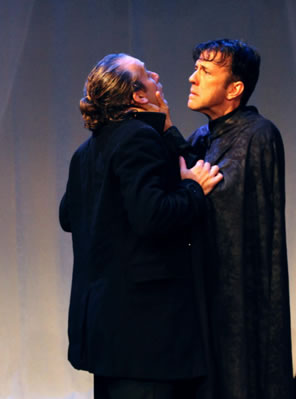
Hamlet (Tyler Moss), with his father's ghost (Pat Dwyer) in The Shakespeare Forum's Hamlet. His father's sudden death totally unsettles Hamlet. Photo courtesy of The Shakespeare Forum.
In what might be his first composition, The Taming of the Shrew, Shakespeare relied on commedia stock characters, with Pantalone represented by Baptista, Katherina's and Bianca's father, and Gremio, Bianca's elderly suitor. Both are fools—not in the sense of Feste the genius jester, but in the old fart sense—and Baptista is tyrannical, forcing his elder daughter on a man she says she doesn't love and locking his younger daughter away from her suitors.
It's not a good start for fathers in the Shakespeare canon, and we go downhill from there—to Titus Andronicus. He kills one of his sons, who at the time was defending his sister, Titus's daughter. He disowns two other sons wrongly accused of murder. And he kills his raped and mutilated daughter. Maybe he just doesn't like kids—of any age—for he also bakes the children of his chief rival in pies. OK, not a good model dad, and Shakespeare wrote him early in his career. So let's jump ahead to the late-career play of The Winter's Tale and Leontes. He, in a jealous rage, imprisons his wife, leading to her supposed death and his estranged son's real death. He then proclaims his daughter a bastard and has her abandoned in the wilds where she endures the dangers of wild bears and Leontes's best friend, Polixenes, who is pretty rough on his own son, too. OK, so not a good model dad, either.
In Shakespeare's time, and in the times that he's portraying, fathers had financial interest in their daughters' marriages, so it's understandable that his dads get ornery when their daughters try to marry against their wishes. Their responses in his plays, though, are to lock the daughter up in a tower (The Two Gentlemen of Verona) and insist that the daughter be put to death (A Midsummer Night's Dream)—and these are the comedies. In Troilus and Cressida, treason is the reason Calchas turns his daughter over to the enemy. The deceased dad in The Merchant of Venice leaves a will forcing his daughter's suitors to pass a test of chests without allowing for her desires at all. Ironically, Portia ends up with her choice passing the test; ironically, too,, many a father (and mothers, too), believe her father's greatst fear was realized when Bassanio won her.
Shakespeare gives us two doting fathers in Romeo and Juliet and another in Much Ado About Nothing. In the former, Montague is relegated to brief appearances when bad things happen, but Capulet is a midmajor character and significant plot driver when he goes ballistic at his daughter, Juliet, balking at marrying Paris. Capulet's behavior prompts Juliet to undertake the disastrous fake death scheme. In Much Ado About Nothing, the genial Leonato goes equally ballistic at his daughter, Hero, after she is falsely accused of sluttishness. Leonato even desires her death.
Dads have a pretty poor showing in Shakespeare's histories, too. Henry VI disinherits his own son so that he can remain king a while longer. After stirring his son, Hotspur, to rebellion, Northumberland chickens out of the fight and abandons Hotspur, who is killed in a battle in which he is seriously outnumbered. Richard III isn't a father in his play, but when he becomes a pseudofather as protector of his dead brother's kids, he has his two young nephews killed.
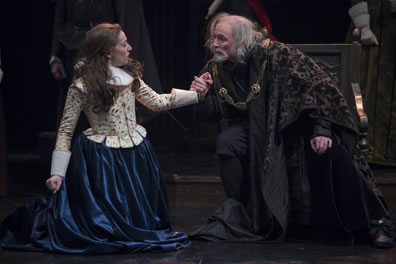 Cordelia (Sara Farb) with her father, King Lear (Colm Feore), in the Stratford Festival production of King Lear. That this father lives to subsequenty carry his dead Cordelia onto the stage is Shakespeare's most emotionally powerful visual in the entire canon. Photo by David Hou, Stratford Festival.
Cordelia (Sara Farb) with her father, King Lear (Colm Feore), in the Stratford Festival production of King Lear. That this father lives to subsequenty carry his dead Cordelia onto the stage is Shakespeare's most emotionally powerful visual in the entire canon. Photo by David Hou, Stratford Festival.Admittedly, I'm overgeneralizing for dramatic effect (just as Shakespeare gets a bit extreme in his portrayals for dramatic effect). Fathers do score a couple of good portrayals in The Comedy of Errors (Egeus searching the world for his lost sons), and King Simonides in Pericles, a real Daddy's Little Girl's father for Thaisa, the kind who would cry when dancing with her at her wedding—however, Shakespeare likely didn't write that part of the play. (Pericles also has Antioch engaged in an incestuous relationship with his gorgeous daughter, but Shakespeare didn't write that part, either.) Then there are the dead fathers who—excepting, perhaps, Portia's—are among Shakespeare's best dads, in All's Well That Ends Well, Twelfth Night, and As You Like It. Duke Frederick is a living father in As You Like It, and though he is a tyrant to everybody else, he gets dad cred for making the politically foolish decision to keep Rosalind, the daughter of his usurped older brother, in his court at his own daughter's request.
But let's get serious now and take stock of the fathers Shakespeare portrays in four plays that deal predominantly with fatherhood, starting with the two Henry IV plays.
Reams of criticism have been written on Falstaff, the surrogate father to Hal, but I want to put the spotlight on the plays' true father and title character. Henry IV has been seen by many critics and actors as nothing more than a cold überpolitician juxtaposed with the gregarious, fun-loving Falstaff. I feel this criticism turns a blind eye to some truths about fatherhood, especially when it concerns a rebellious son. I owe this understanding to Jeremy Irons' portrayal of the part in the Hollow Crown series. Henry misses his son ("Not an eye but is a-weary of thy common sight, save mine, which hath desired to see thee more.") is embarrassed by his son ("Whilst I, by looking on the praise of [Hotspur], see riot and dishonour stain the brow of my young Harry"), and wonders how his son got that way ("Let me wonder, Harry, at thy affections, which do hold a wing quite from the flight of all thy ancestors").
Henry is like many dads who want to share their passions, knowledge, vocation, and avocations with their kids, only he has a royal duty to do so. And many kids roll their eyes when forced to humor dad, including, apparently, princes. Tom Hiddleston as Hal does this to Irons' Henry and gets a slap across the face, to which many a dad probably thinks, Go Dad Go. Furthermore, comparing your slacker kid with the all-state stud of some other dad may be considered a sin, but it's a natural thought in the minds of many a dad when they are frustrated with their own slacker kid. It's interesting, though, to note how much Hal ends up learning from his dad, from political maneuvering and managing his court to currying the love of his people. Criticize Henry IV all you want but, in the long run, he succeeds as a father (unless you have issues with Hal's behavior in Henry V, but all of us fathers are doomed to hell if we are held responsible for the sins of our children).
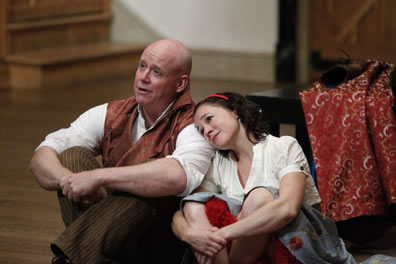
Miranda (Miriam Donaldson) with her father, Prospero (James Keegan), in the American Shakespeare Center's production of The Tempest. Not entirely certain of his ways and means but intent on paving a path to lasting happiness for his child. (Photo by Tommy Thompson, American Shakespeare Center.)
Fathers and fatherhood play prominent roles in Hamlet. Perhaps the Ghost of King Hamlet is a devil, but he at least tells his son the truth. And his son adored him. Upon Horatio describing the elder Hamlet as "a goodly king," the son Hamlet replies, "He was a man, take him for all in all. I shall not look upon his like again." His father's sudden death totally unsettles Hamlet, even before he sees the ghost, and that points to the close and mutually respectful relationship the two had that we actually sense in their ghost-to-son conversation.
Shakespeare likes to use parallel themes in his subplots, and so we get another study of a father in Polonius. Set aside the debate over whether Polonius was a fool, an innocent victim, an honest counselor, or a suck-up courtier; concentrate here on his status as a father. Yes, he's something silly in his preaching the precepts to Laertes, and he's somewhat domineering in admonishing Ophelia to keep away from Hamlet. However, the precepts are good fatherly advice, and in the context of the play his instruction to Ophelia is wise (Hamlet as a royal prince could only dally with the commoner Ophelia) and his warnings about Hamlet turn out to be true, no matter what Hamlet's motivations and state of mind may be. In the play's third scene, we see a happy, loving family unit of a father with his son and daughter. Compare that with what we see after Polonius's death: Laertes is in a blind, revengeful fury and Ophelia has succumbed to insanity. I've seen productions that hint at Hamlet being the object of Ophelia's hallucinations, but her references to death, which include "barefaced on the bier" and "beard as white as snow," seem to indicate the impact of her father's death on her psyche.
Shakespeare takes on the state of fatherhood fully, and bitterly, with King Lear. The play centers on the relationship of Lear and his three daughters, two of whom are serpent's teeth and the third a blundering fool. The play's subplot involves Gloucester and his two sons, one a greedy bastard (literally), the other a blundering fool. Both Lear and Gloucester wrongly disown their true children, and both endure major impairments—Lear madness, Gloucester blindness—indirectly but most assuredly at the hands of their vengeful children. Both fathers rely completely on the mere duties owed to fatherhood, totally unaware that they are dealing with children who have absolutely no respect for the state of fatherhood. Lear has a personality that is easy to despise, but Shakespeare goes to great lengths to indicate that his predominant trait is old age and the debilitations—mental and psychological—that come with that. Lear's tragedy is the dissolution of fatherhood.
Notably, both fathers are rescued only when their fatherhood is restored by their true children. The blind Gloucester, thrust out on the heath, ends up with Edgar, disguised as Mad Tom, and we get a sequence of scenes of the son leading his father not only to Dover but to salvation from despair. Edgar remains in disguise, and his revelation to the dying Gloucester comes only through Edgar's description. We get to see the restoration of Lear with his youngest daughter, Cordelia, a reunion scene that, on the page and when played well, is a tear-duct wringer. "I know you do not love me," Lear tells her, "for your sisters have, as I do remember, done me wrong: You have some cause, they have not." "No cause," Cordelia replies; "no cause." Upon their capture after the battle, Lear sees Cordelia as daddy's little girl again, and they'll go to prison as if it were her playroom where "We two alone will sing like birds i'th'cage." That this father lives to subsequently carry his dead Cordelia onto the stage is Shakespeare's most emotionally powerful visual in the entire canon.
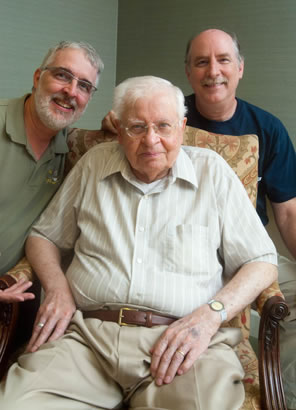
Eric and my brother, John, with our father, Dean. "His gentle means of sculpting souls took me years to understand." Photo by Dawn D. Hanna.
Shakespeare is a little less bitter in his next play to expound on the theme of fatherhood, The Tempest, perhaps not so ironically Shakespeare's last solo composition for the public stage. Pop criticism likes to see the play as autobiographical, Prospero the magician (creator of visions) heading off into retirement; to me, the only real autobiographical element in the play might be of Prospero as Miranda's father, and even in that it's not so much a self-portrait but, at most, a meditation. Shakespeare seldom accompanies a father with a wife, but here the single father aspect of the character is a stark one: Prospero and the 3-year-old Miranda were stranded on a desert isle. Prospero gets servant help from Caliban and various spirits, but for 12 years he has been the hands-on nurturer of his daughter, feeding her, clothing her, teaching her, protecting her. A key part of his plot to entrap (and perhaps take revenge) on his brother and the King of Naples for deposing him from his dukedom is to make sure that Naples' son, Ferdinand, hooks up with Miranda. The cynic might see this as political marriage maneuvering, but Prospero's hot (let me show you my magic, son) and cold (keep your paws off my baby girl!) behavior toward Ferdinand indicates the sincerity of his actions because—well, it's so much like a dad. I don't have daughters, but I've seen dads with daughters who want to get them married to a nice (wealthy) guy but still maintain a protective perimeter around their little girl.
As with all of his comedies, Shakespeare wrote a dark undertow to The Tempest, and the person of Prospero himself can be interpreted in many ways: as a despot, as a brutal colonizer, as a bitter old man ever-feeding on his grudge. However, the best productions of this play I've seen are determinedly comical, and the one strand they have in common is a depiction of Prospero as a father who dotes on his daughter and wants only the best for her (even if that means binding her uncle in cramps, or whatever Prospero intended to do to him). From the moment I first read it while in college, The Tempest has always been one of my favorite plays, and I think that's because I so appreciated the character of Prospero, not entirely certain of his ways and means but still intent on paving a path to lasting happiness for his child.
I saw in Prospero my father and his father, two of the sweetest, most loving men I've ever known. My dad always seemed something of a magician when I was growing up: He could command spirits (he was a minister and Air Force chaplain), and he had a vast knowledge of this world and the spiritual world compared to my limited scope of the universe. He always did what was best for me, even when it was hard on me, even when it hurt. But as Dan Fogelberg sang in "Leader of the Band," "His gentle means of sculpting souls took me years to understand."
Fatherhood, to me, is a state of grace. It is what Henry IV strives for, what Polonius knows too briefly, what Lear is denied, and what Prospero practices. You can't jam appreciation for that into a single day, but it's a good start.
Eric Minton
June 19, 2015
Comment: e-mail editorial@shakespeareances.com
Start a discussion in the Bardroom



 Find additional Shakespeareances
Find additional Shakespeareances